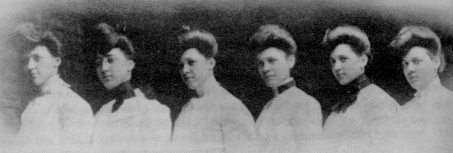
STONE SISTERS (1879-1975)

The Stone sisters became the proprietors of the first black-owned
beauty parlor in downtown Nashville. Their business was on the corner of
Sixth Avenue, North, and Union Street near the present site of the Tennessee
Performing Arts Center. The sisters catered to a clientele of wealthy white
women, and they introduced the first permanent-wave machine, which they
learned to use at Frederick's in New York City. They sold hair pieces and
wigs from France and used hair-weaving equipment, hair dryers, and hair-cutting
tools, among other innovations. The sisters developed "Stone-White,"
a skin bleach lotion, and sold it at their beauty parlor. The Stone sisters
resided at 1613 Jefferson Street, immediately across the street from Fisk
University's Jubilee Hall.
Lee Stone (1879-1954), Sallie K. Stone (1881-1954), and Nannie Stone
(1885-1975) began working in the early 1900s as apprentices at McIntyre
Beauty Parlor, after arriving in Nashville from their birthplace in Maury
County, Tennessee. The three sisters were joined by another sister, Emma
Stone (1889-1934), who completed the pharmacy program at Meharry Medical
College in 1907 and operated the Campus Drug Store at 1712 Jefferson Street.
In 1915, the sisters bought the McIntyre Beauty Parlor from its white owner,
May McIntyre, for the sum of $500. The sisters operated the lucrative business
until the 1930s. The Luke Leas, the Percy Warners, the Robert Cheeks, and
other prominent white families frequented the Stone sisters' downtown establishment.
Two other sisters were not involved in the beauty parlor business: Augusta
(18761917) and Hortense (1883-1959). Augusta married Jefferson D. Fowler,
a physician and teacher at Meharry. Hortense, the mother of the author
of this article, married George Richardson White, a former dental student
at Meharry.
The mother of the Stone sisters, Sallie Brooks Stone (1858-1923), was
born a slave. The father of the girls, John Secrest, was a prosperous white
Jewish planter in Maury County. The girls inherited some Indian blood from
their maternal grandmother, Sallie.
The Stone sisters held membership at the Gay Street Christian Church.
Lee, Nannie, and Emma sang in the church's choir. The Stone family was
compassionate and sensitive to the issue of racial oppression. The mother
often visited the sick and gave money and food to the poor. The sisters
unsuccessfully used money and influence to gain the release of a black
Knoxville man accused of killing a white woman in 1919.
The Stone sisters, except for Nannie, are buried in Nashville's Greenwood
Cemetery. Nannie was buried in California with her husband, dentist Thomas
H. Grantham.
Emma White Bragg